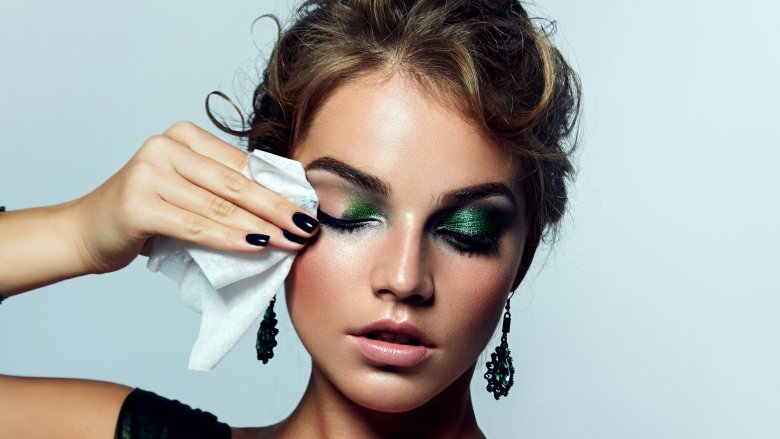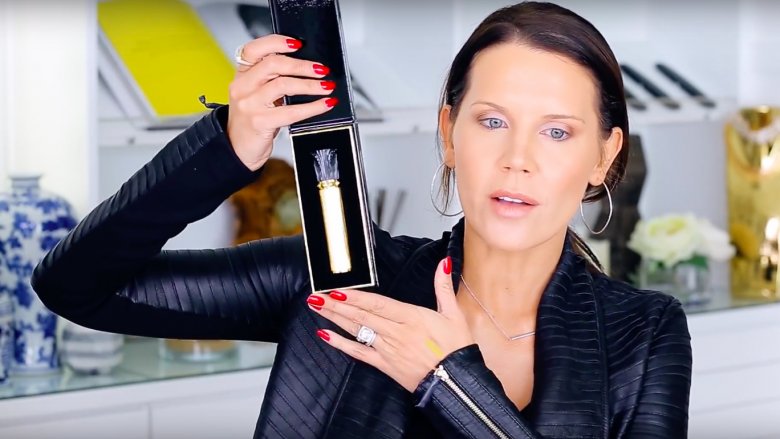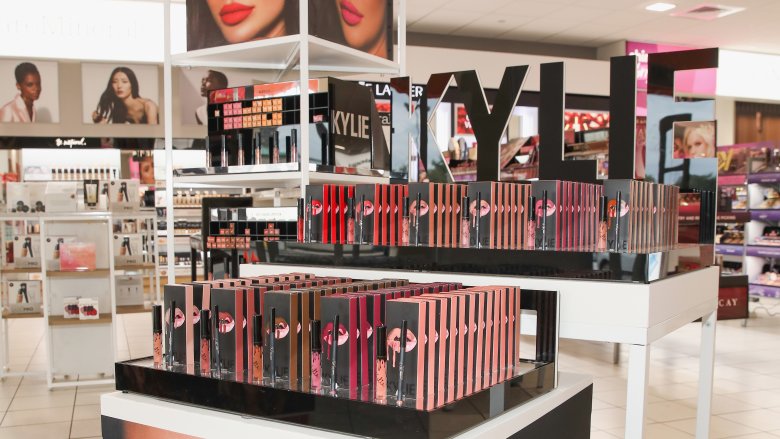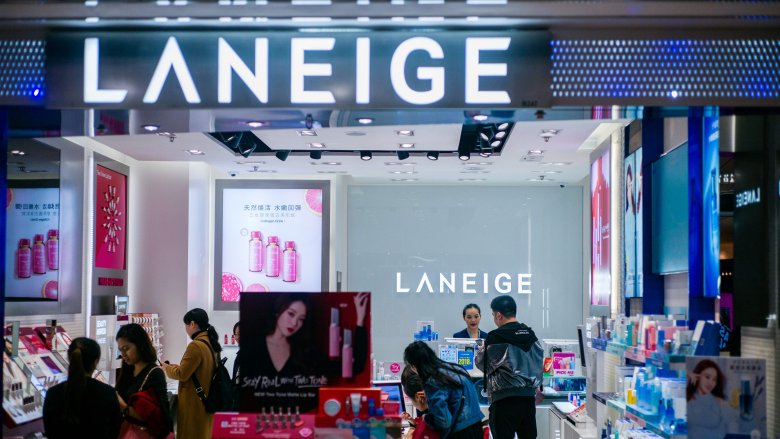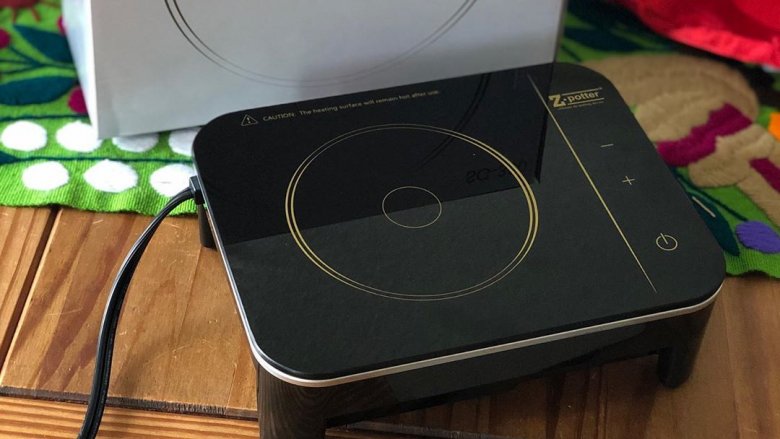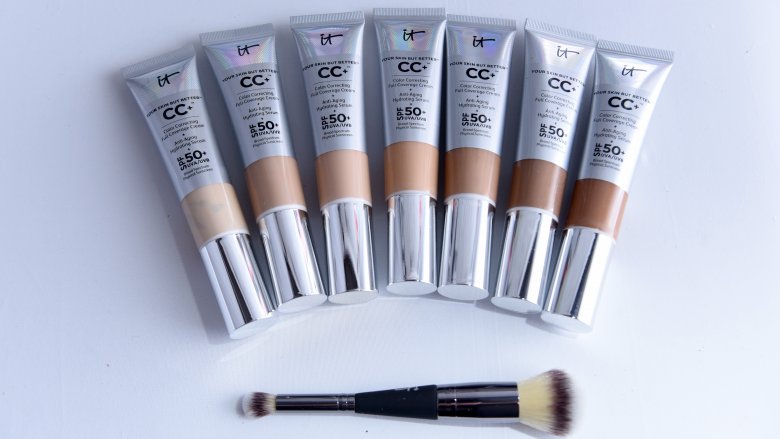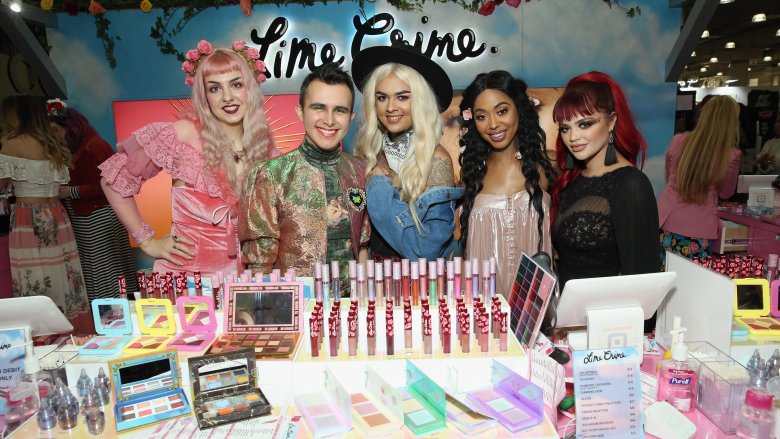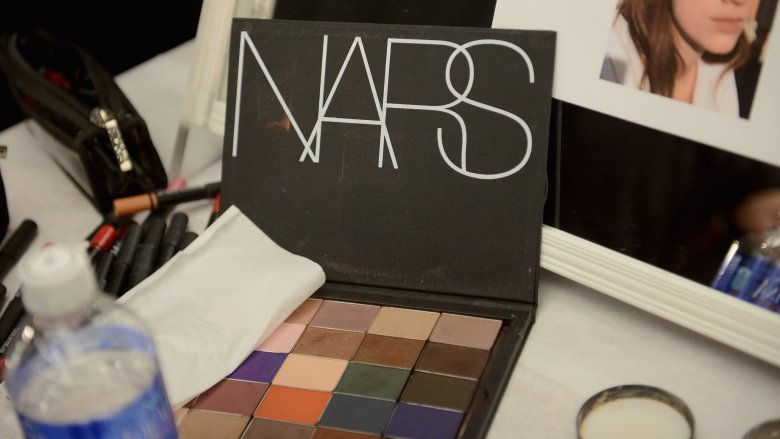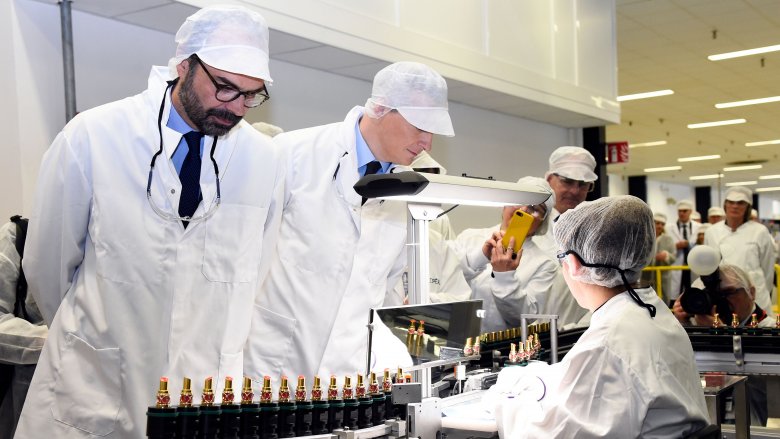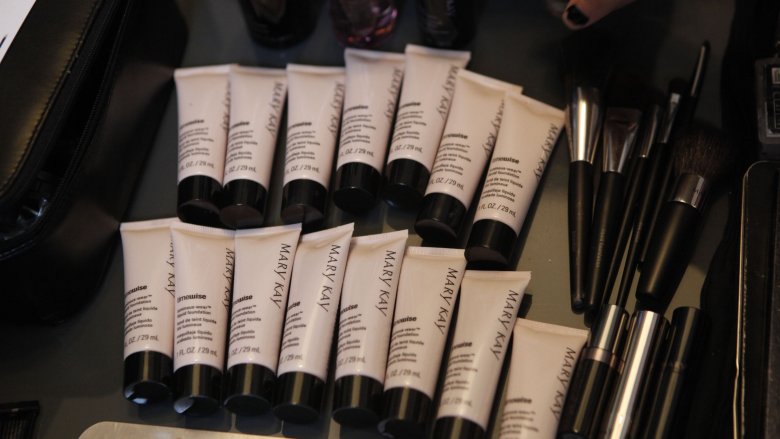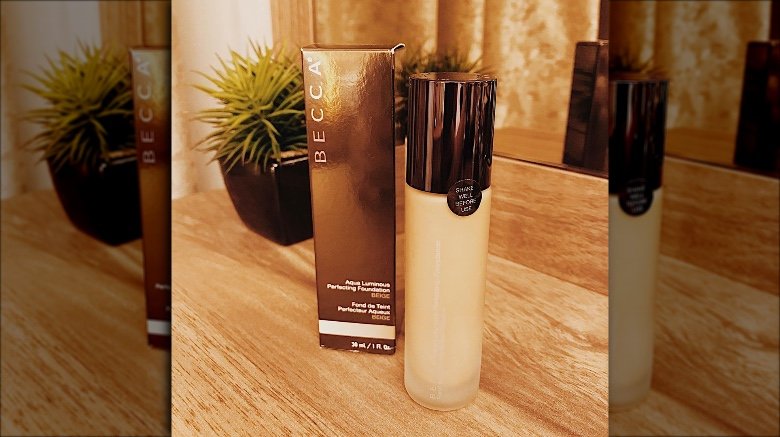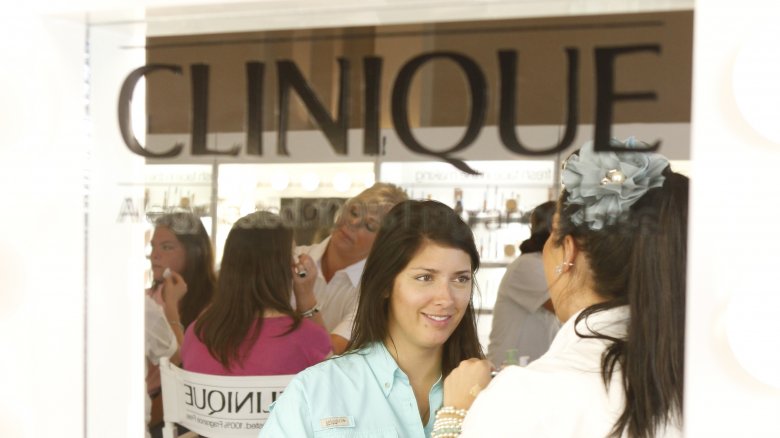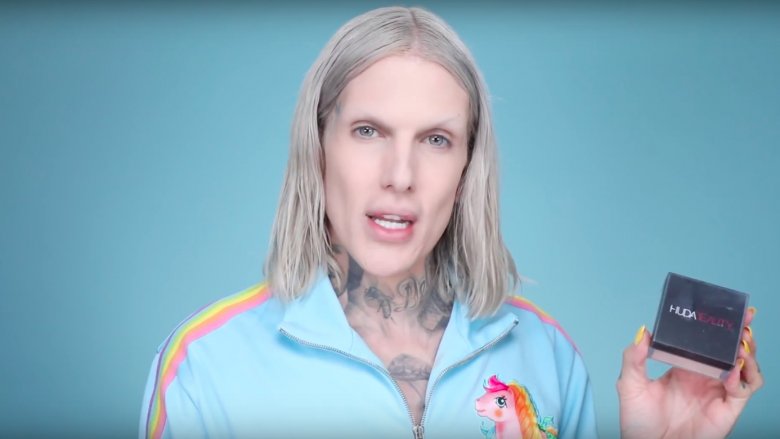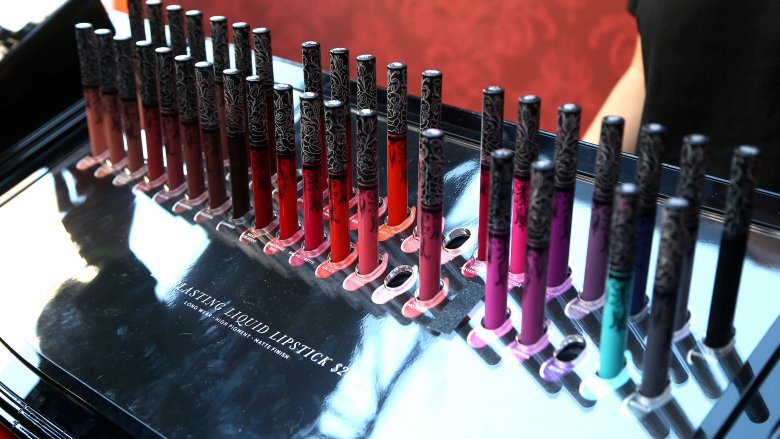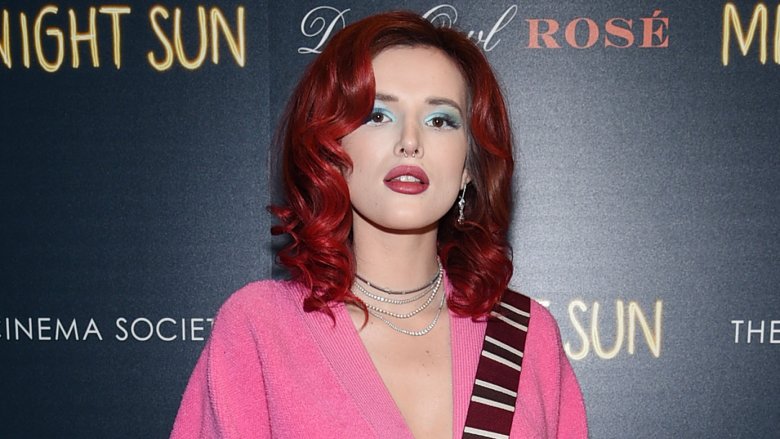Makeup Brands That Aren't Worth The Money
We may receive a commission on purchases made from links.
The beauty industry is booming. By 2017, the sale of beauty products totaled an astounding $445 billion. About $17.7 billion of those sales came from high-end makeup alone, according to The NPD Group. While it's worth it to pay more for several of these "prestige" brands, that cannot be said of all luxury labels. Some just don't live up to their hype — nor their price tags.
When speaking to HuffPost, Ni'Kita Wilson, a cosmetic chemist and founder of skinects.com, pointed out that "luxury brands are only targeting those who purchase luxury products and are not considering those who purchase drugstore products." But, in some cases, you may be better off purchasing makeup from your local pharmacy.
Cynthia Paredes, a Florida-based makeup artist told Vice: "Plenty of drugstore makeup can achieve a similar look as expensive products." However, even some drugstore varieties aren't worth their price tags despite being much more affordable. With reasons ranging from a lack of diversity to stolen ideas to simply just being too expensive for what you get, here are all the makeup brands — prestige and mass — that aren't worth your money.
Christian Louboutin Beauty
Christian Louboutin is a name everyone knows, but when it comes to beauty products, that may not be enough. Louboutin is a luxury brand and those luxury prices certainly extend to the company's beauty products. A 0.23-ounce pot of eyeshadow, for example, retails for $50. If lipstick is more your jam, prepare to spend $90 per tube. That's a hard pill to swallow, for sure. And, apparently, it's not even worth it.
Makeup artist and YouTube personality Tati tested out the entire Christian Louboutin Beauty Spring 2017 collection on her channel and gave her honest feedback. Spoiler: it wasn't great. "Mmm, no," she said of the brand's eyebrow pencil. Although she admitted that the liquid eyeliner was "not bad" after trying it, she didn't feel it justified the $75 price. Likewise, she was a fan of the mascara, but also recognized that drugstore mascaras have worked just as well. In the end, she revealed, "I don't think any of this is worth the price." Save those dollars for another makeup brand.
Kylie Cosmetics
In 2018, Kylie Jenner's eponymous beauty brand was valued at nearly $800 million. Through her large social media following, Jenner has been able to attract many consumers to her label since its launch in 2015.
However, Li Jin, an investment partner at the venture firm Andreessen Horowitz, pointed out a potentially fatal flaw in her brand. "To become an enduring, standalone business, it's necessary for all influencer brands to go beyond being tied to a single person, and create a 'purpose brand,'" she revealed on Twitter. Fame — that which propelled Kylie Cosmetics into success in the first place — could also be what causes her demise when her "individual popularity inevitably wanes."
And that's not even taking into account the scandals the brand has already faced. In 2017, TMZ reported that at least 15 people had filed complaints with the Better Business Bureau, citing a strong chemical smell from the Royal Peach Eyeshadow Palette, which led to "horrible headaches." On Indeed, several employees of Spatz Laboratories, where Kylie Cosmetics are produced, have even cited "sweat-shop"-like conditions. Eek.
Laneige
Laneige was one of the first beauty brands to adopt the Korean cushion foundation trend in the west, according to makeup artist and YouTuber Jackie Aina. As such, Aina was excited at the possibility of finding a cushion foundation in a darker shade. Unfortunately, by late 2016, the brand's darkest shade of this $38 foundation was Medium/Dark. Aina recognized that the chemical composition of lighter foundations are easier to produce, but was rightfully frustrated at the lack of diversity. In the end, she dubbed the brand one of "the worst beauty brands ever for [people of color]."
"If you read the [cosmetic science] textbooks, it seems like an impossible thing, because historically formulators and chemists didn't factor in diverse skin tones," Florence Adepoju, a chemist and lipstick designer, told W Magazine. That wouldn't stop Rihanna, though. In 2017, her Fenty Beauty brand upped the ante by creating an impressive 40 shades of makeup. With its incredible success, other brands took notice and finally began to develop formulas for a wider variety of skin tones. As of 2019, even Laneige now has a "cacao" tone, but the brand still only produces their cushion foundation in a total of six shades.
Z Palette
When it comes to promoting products, Instagram can be a major resource for beauty brands. Just ask Kylie Jenner. Misuse social media, though, and suffer the consequences. Enter: Z Palette.
In 2017, Z Palette launched a product called the Z Potter, a machine that uses heat to remove makeup from its packaging so you can essentially curate your own palettes. Although a solid idea, customers thought $85 was quite the markup for something many felt resembled a hot plate. Z Palette responded to their customers' negative feedback, but not in a way you might've expected. As Seventeen reported, some compared the company's comments to bullying. They're not wrong. After all, the brand did insult the personal appearance and financial status of some of their customers.
Before long, fans and later brands began dropping Z Palette. Boxycharm took to Instagram to denounce the brand, writing, "'Work hard and be nice to people.' Boxycharm will always treat our Charmers with love and respect. We do not agree nor support Z Palette's recent statements in regards to their customers." Z Palette continues to market their products, including the Z Potter — although the price has been reduced to $59.
IT Cosmetics
If you're looking for a beauty brand with a variety of shades, IT Cosmetics just ain't it, according to makeup artist and YouTube personality Jackie Aina. "My issue with It Cosmetics is not the products," she said in a vlog. "It's whoever is formulating those shades. You need to have a long talk with them." The ironic thing is: IT Cosmetics is owned by L'Oréal, which has its own Multicultural Beauty Lab with state-of-the-art technology and talented chemists.
Aina highlighted the lack of diversity back in 2016, but the brand faced similar controversy when launching a new foundation, Bye Bye Foundation, some two years later. Just three shades — three! — were available for darker skin. A representative for the company told Allure that IT Cosmetics was "not able to go darker than our deepest shade" due to the SPF in the foundations. "Expanding our shade range is a top priority and we are working on it!" the rep added.
Lime Crime
To put it gently, Lime Crime has a cringe-worthy past. Much of the controversy surrounding the brand has stemmed from Lime Crime founder Doe Deere (aka Xenia Vorotova) — though not all. "There's been a Hitler costume; a security breach and subsequent multiple credit card hackings that resulted in the company settling a class-action lawsuit; accusations of cultural appropriation; and a brush with the Food and Drug Administration over misleading packaging, among other things," wrote Racked. Yikes. Deere took on a more behind-the-scenes role, and then eventually sold the company in June 2018.
Although their controversial days are (hopefully) a thing of the past, Deere and her husband still serve on the board of directors. "As founders," she revealed on Instagram, "we are the guardians of the brand." Her statement continued: "We'll provide key insight and guidance to the team to ensure we remain mindfully committed to our brand's mission, and you — our loyal fans. I will also still happily contribute to product development and even pitch in social media sometimes."
NARS
You may have thought that NARS would always be a beloved makeup brand. But, in 2017, the company began selling to China and thus became a company that tests on animals. After criticism from fans, the brand took to Instagram, writing, "We want you to know that we hear you. The global elimination of animal testing needs to happen." The company added that although they believe that there are better methods, they needed to comply with "the local laws of the markets in which we operate, including in China." The statement continued, "We have decided to make NARS available in China because we feel it is important to bring our vision of beauty and artistry to fans in the region. NARS does not test on animals or ask others to do so on our behalf, except where required by law."
As evidenced by the response from fans, though, this wasn't enough. Many expressed their desire for the company to stop selling in China and have boycotted the brand. Those against animal-testing would argue that NARS is no longer worth the money — nor the cost.
L'Oreal
Like Nars, L'Oréal also sells products in China, and is thus considered a company that tests on animals. But, that's not the only reason why some have deemed the drugstore classic not worth the money. According to Forbes, the FDA tested hundreds of lipsticks and discovered that every single one contained lead. Not only that, but of the ten most contaminated ones, five were made by L'Oréal.
In a statement (via NJ.com), the Campaign for Safe Cosmetics petitioned the brand, saying, "It's time for L'Oréal to get the lead out of its product." Stacy Malkan, a spokeswoman for the organization said, "The problem with lead is it's extremely toxic at the lowest doses. Lipstick is a product that we put on our lips and ingest directly into our body, so it's of higher concern than other products."
Nneka Leiba, director of Healthy Living Science at Environmental Working Group, agrees. "The main problem with lead is that it's neurotoxin in that is has an effect on the brain," the expert told Reader's Digest, advising consumers to "avoid lipsticks that they know have tested high in lead contamination."
Mary Kay
Mary Kay has been a mainstay in the beauty industry since the '60s. However, the brand's reviews on Consumer Affairs are worrying — to say the least. There are complaints about inconsistent formulas in products and even claims of skin irritation and burning. But many have turned away from the beauty brand not because of its products, but because of its business model.
Although Mary Kay is technically classified as a mid-level marketing company, Virginia Sole-Smith, an investigative journalist, revealed in an article for Harper's Magazine (via CBS News): "A business in which only a select few earn real money while everyone else pays to play sounds a lot like a pyramid scheme." And, because the products are generally marketed to women, the journalist has dubbed Mary Kay a "pink pyramid scheme." There's even a site, Pink Truth, that is, by its own admission, "dedicated to exposing Mary Kay Cosmetics" among other similar organizations that "target women."
BECCA Cosmetics
If you're going to spend $44 on an ounce of foundation, it's not unreasonable to expect it to, you know, work. Nevertheless, some customers were really disappointed with BECCA Cosmetics' Aqua Luminous Perfecting Foundation. Makeup reviewer and YouTuber Jessica Braun said she was excited to try it and, of course, wanted it to work well — especially given the price — but highlighted the foundation's inability to blend into her skin. "It was just weird," she recapped in a vlog.
BECCA has also faced criticism for one of their 2018 ad campaigns. "So did BECCA Cosmetics really refuse to hire black women for these swatches? They just edited a white hand darker?" one person tweeted along with a picture of four hands holding the brand's Skin Love Weightless Blur foundation. Others also chimed into the conversation, with one person emphasizing the need to "stop supporting problematic brands."
BECCA responded to the backlash the following day with a reshoot of the ad and a promise to "remain committed to continually representing our inclusive BECCA Beauties," but many wondered why the brand didn't do that from the start.
Clinique
The customer is always right — right? Unfortunately, Clinique gets a solid 2-star rating from customers on Consumer Affairs. That's a big yikes. "I used the eyeshadow base one time and had a reaction that has lasted two weeks," one verified reviewer wrote. "I have an appointment with my [doctor] this afternoon. Severe itching, redness all around my eyes and my eyes are bloodshot and tearing." In addition to allergic reactions, other customers pointed to changed formulas and poor customer service as reasons they've started switching to other brands.
Makeup artist and YouTube personality Tati also dubbed one of Clinique's products "awful" and admonished fans to "save [their] money." The brand's Pretty Easy Liquid Eyelining Pen, which retails for $21, just doesn't stay put, according to the beauty guru. "It just gets everywhere. It collects in the inner corner, it smears, it feathers, and I only had to wear it one time to realize that I was just not going to wear it again." She continued, saying, "It is a hard pass."
Huda Beauty
When Huda Kattan shared a sneak peek from her upcoming line of her Huda Beauty brand on Instagram, fans quickly noticed something was amiss. As Popsguar reported, the brand's new line, Huda Easy Bake, looked awfully similar to Beauty Bakerie's products. According to the publication, one fan commented, "Huda, I am a fan of your makeup, however this is so disrespectful to the [Beauty Bakerie] line. Use your platform to support smaller brands like them and give credit to who it's due."
YouTuber and makeup guru Jeffree Star addressed the controversy on his channel, saying, "Huda has really never acknowledged it. She's just keepin' movin' — making her money. I don't like that." Star did try one of the products from the line and was even more disappointed that it was actually pretty good. He explained: "That's actually pretty sad because I would love to support this collection, but if you're gonna steal from people and not acknowledge it? Can't relate."
Kat Von D Beauty
Wherever Kat Von D goes, controversy is sure to follow, it seems. This is especially true when it comes to Kat Von D Beauty. When the tattoo artist first launched her makeup brand, she released a lipstick in a color called "Underage Red," according to The Independent. At the time, she was criticized for helping to promote the sexualization of young girls. Von D, however, said the name was not about sexualization, but "feminine rebellion." Instead of changing the product's name in the face of backlash, Von D criticized the criticizers, saying anyone who "automatically jump[ed] to a disgusting conclusion" should consider how they got there. Oh boy.
In 2016, more drama ensued when the beauty guru Jeffree Star got into a very public feud. Then, in 2018, more Kat Von D Beauty fans jumped ship when the star revealed on Instagram (via Cosmopolitan) that she would not be vaccinating her children. One person tweeted that she had decided to take what she would've spent on Kat Von D Beauty and gave a donation to Gavi, an organization that provides vaccines to children in developing countries and, before long, the hashtag #boycottKatVonD began trending.
Filthy Fangs
When Bella Thorne launched her makeup brand, Filthy Fangs, in 2018, not everyone was a fan. As Cosmopolitan reported, fans were quick to point out similarities between Thorne's eyeshadow palette and the palette created by Juvia's Place. In addition to the claims of copycatting, some makeup enthusiasts could not fathom spending $60 on a simple palette, whereas others thought the star's makeup looked cheap or, as one person tweeted, like "halloween makeup you buy at the drug store." Ouch.
A spokesperson for Juvia's Place spoke to Page Six about Thorne's imitative product. "The public has spoken and we are disappointed Bella Thorne's makeup would try to steal from an independent black-owned brand that has no financial backing," the rep revealed. "This isn't the first time we have heard and seen mainstream media personalities steal from smaller brands. It's unacceptable and disgraceful." Thorne's products allegedly sold out and the Filthy Fangs website has not been updated with more makeup as of this writing, though the star has teased future lip products.
